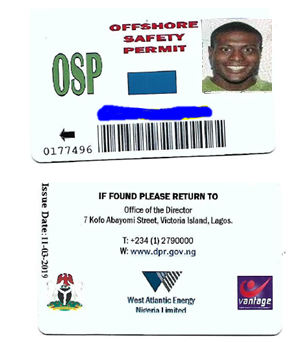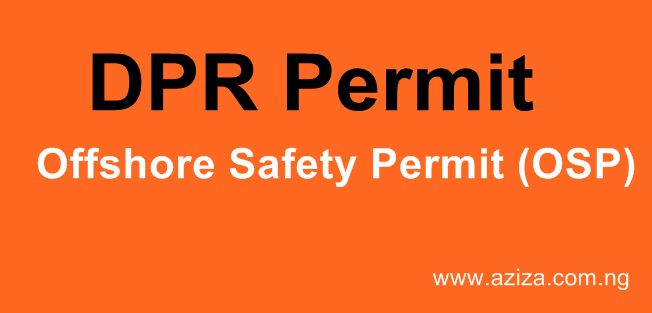In this post, we detailed how to obtain Offshore Safety Permit (OSP), the requirements, the costs/ fees and the processing steps.
The Federal Government of Nigeria through Minister of Petroleum Resources launched the Nigerian Petroleum Industry Offshore Safety Permit (OSP). The primary purpose of launch of the OSP is for the tracking of personnel working in Onshore and Offshore locations, managing installations owned and/ or operated by Oil and Gas operators and contractors in Nigeria to achieve the vision of zero offshore incidents.
DPR OSP Permit can be issued to individuals or a corporate organizations.
OSP is issued on personnel’s name and it is for operate in Nigerian Offshore Oil and Gas locations.

Read: Business/ Company Registration in Nigeria
Offshore Safety Permit (OSP) Fees/ Cost & Steps
– The cost is USD 580 per person for new application.
– BOSIET Certificate from DPR accredited Center
– Medical Certificate
– Annual renewal fee is USD 135 per person.
– You make payment into the DPR account and send the proof of payment.
– Upon confirmation of payment, your data is uploaded unto system and image capture advice sent to you.
– You get the registered personnel image capture done and revert to us after they have had their images captured.
– An attestation letter will be issued upon confirmation of image capture. – And OSP permits will be issued.
The OFFSHORE SAFETY PERMIT is given to personnel of an organization through company’s application/ request.
Read: Permits & Certificates for Oil and Gas in Nigeria
Offshore Safety Permit (OSP) Requirements
- Personnel Training certificate (e.g. BOSIET, HUET, etc)
- Personnel’s Medical fitness
- Personnel’s Name
- Employer’s/ Company name
- Personnel’s Phone number/ address
- Personnel’s email
Processing:
- Fill in the required Form. This will contain Personnel’s data and attached medical certificates.
- Vet Personnel’s information and issue you an invoice accordingly.
- You make payment to DPR and provide proof of payment.
- Arrangement to capture the registered personnel image will be done and when the process is completed, an attestation letter will be issued upon confirmation of image capture.
- An OFFSHORE SAFETY Permit will be issue permits 2-3 working days after image capture.
All these process can be completed within two weeks depending on your ability to respond.
The cost is USD 580 per person and it last for one year and is renewable. Subsequent annual renewal fee is USD 135 per person.
IMPORTANT!
When making the application, make sure you confirm with your personnel if they have previously been registered for or issued an OSP card (permit), as no personnel is authorized to have more than one OSP card. If they have already been issued permits, you may only be required to pay for the renewal of their permit rather than the full cost of a new registration.
In 2011, the Department of Petroleum Resources (“DPR”) in Nigeria began the issuance of the OSP in connection with new safety and personnel accountability measures in the offshore areas of the Nigerian oil and gas industry .
All Exploration and Production Companies, as well as Oil Services Companies working in offshore areas of the Petroleum Industry are now obligated to obtain OSPs in respect of personnel working offshore.
Read: NUPRC Permit Requirements, Cost and more
The DPR has appointed a company as its agent for the administration of the OSP issuance process and for maintaining the requisite personnel safety records. The DPR agent shall also be responsible for issuing the OSPs, as well as maintaining Personnel on Board tracking system for the Petroleum Industry. OSPs are to be issued upon completion of the relevant information such as the offshore worker’s bio-data and employment information contained in the application form and payment of prescribed fees.
The current application fee for the OSP is $580 one off payment for every offshore worker and is renewable on a yearly basis at a fee of $135.

